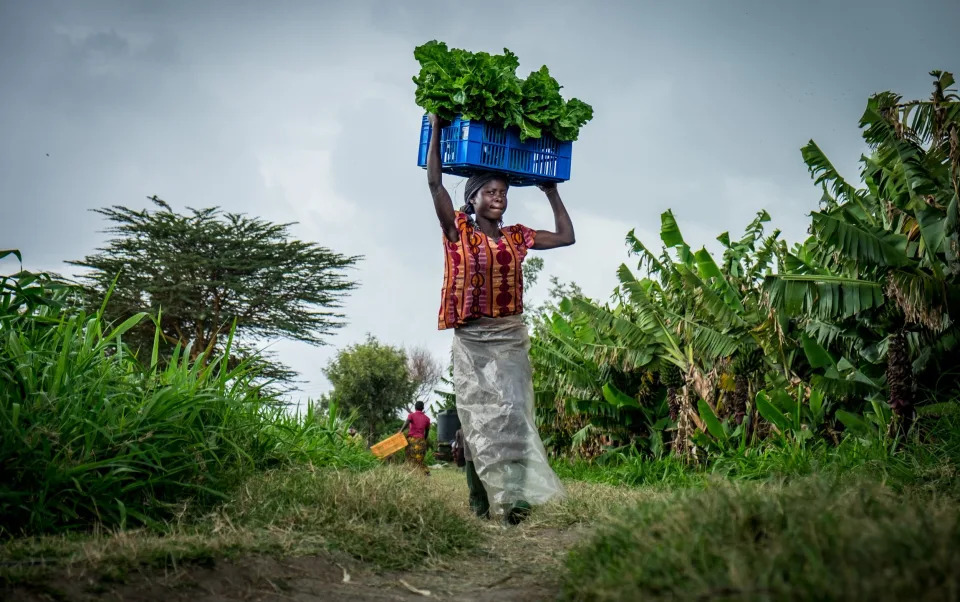Agnes Kalibata
22 December 2023·

Cop28 has provided a remarkable opportunity to accelerate the transformation of food systems in ways that align with intentions for climate action, protect nature, improve nutrition and safeguard rural livelihoods. - boezie/E+
As 2023 draws to a close, with the world hotter than ever and on track to exceed 1.5 degrees warming, world leaders are increasingly concerned and strive ever harder to agree on ambitious climate action. They have focused on an increasingly pressing issue: food.
The interactions between food and climate had surfaced around the UN’s Food Systems Summit in 2021, where it became clear that climate change threatens agricultural productivity, disrupts food supply chains, reduces resilience, erodes the livelihoods of millions of farmers and food workers, and threatens food and nutrition security (especially for women and children). The impact of these interactions on people has been exacerbated by the impacts of Covid-19, increased levels of conflict, and increases in the cost-of-living.
At the Cop28 annual climate meeting, in Dubai, the governments of 154 countries endorsed the groundbreaking Cop28 UAE Declaration on Sustainable Agriculture, Resilient Food Systems, and Climate Action. They committed to address both food system vulnerabilities to climate change and the impacts of food systems on climate and nature. This is an important first, and a sign of the concerns being felt everywhere.
In Europe the concerns are felt in higher food prices, and strained household budgets as a result of income poverty (which threatens more than 20 per cent of the population). In Sub-Saharan Africa, smallholder farmers whose communities depend on agriculture are bearing the brunt of record high temperatures and extreme weather events.
In addition, modern food systems drive 90 per cent of deforestation and 60 per cent of biodiversity loss, and account for 70 per cent of the world’s use of fresh water. They are also reliant on fossil fuels which are used for production of pesticides; synthetic fertilisers and plastics; and in processing, transport, distribution and cooking. Overall, food systems contribute over one third of global greenhouse gas emissions.
A global collaboration
Cop28 has provided a remarkable opportunity for accelerating the transformation of food systems in ways that align with intentions for climate action, protecting nature, improving nutrition and safeguarding rural livelihoods.
Everyone has a role: rethinking and innovating on how food is produced, stored, packed, processed, traded, distributed, marketed, consumed and disposed of. At Cop28, it was evident that farmers seek to be partners in the transformation — which should be informed by evidence and experience, and involve marginalised and vulnerable groups. Traditional agricultural approaches, which have produced food in harmony with nature for millennia, should also inform this process.
Improved weather forecasting is one example of a technology available today, with the potential to benefit 260-305 million farmers in Asia and Sub-Saharan Africa. Multiple studies have shown that farmers across these regions adjust their behavior and investment decisions based on these highly specific forecasts, and the payoff is clear. In Benin, for example, farmers who received SMS forecasts earned $104-$356 more per year than farmers who did not.
Implementing transformation is not easy and will require a significant financial commitment. At Cop28, we saw some progress. Representatives of the half billion small-scale farmers and fisherfolk, many from the communities most vulnerable to climate impacts, pointed out during the Cop that they need support as they struggle to adapt to a warming world. Notably, several financial pledges were announced while others are in the making.
Government representatives described their plans to incorporate action on climate and biodiversity within efforts to transform national food and water systems in ways that contribute to food and nutrition security for all and encourage the reliance of farmer livelihoods. Representatives of international organisations described how they will intensify collaboration to ensure intensified support for these national efforts. New multi-stakeholder partnerships for research, innovation and collective are being developed.
Government involvement in transforming food systems is crucial since governments provide the enabling conditions for producers and consumers to make healthier and more sustainable food choices. School meal programs, for example, feed over 400 million children worldwide, providing a huge, predictable market for food. Large-scale public programs such as these offer a unique opportunity for governments to procure food that is nutritious and sustainably sourced, impacting food systems and improving diets on a national scale.
The potential prize is great. We are witnessing innovative solutions that help address food and nutrition insecurity while contributing to action on climate and biodiversity crises, but these solutions need to be adopted and deployed globally. This must be done in close collaboration with farmers, businesses, civil society, local authorities, national governments, and international processes. It is anticipated that the UAE will encourage a constellation of convergent support during 2024, the year of its Cop presidency.
Left as they are, food systems will continue to accelerate climate breakdown and biodiversity decline, fail to nourish people and leave them exposed to future shocks. With concerted attention they can provide food that is healthy, affordable and nutritious, help halt and reverse biodiversity collapse, and insulate humanity from future climate shocks that are inevitable for the coming decades.
For humanity, everywhere, usual food business is no longer an option.
Agnes Kalibata is President of AGRA and former UN Special Envoy for the UN Food Systems Summit; David Nabarro is Strategic Director of 4SD Foundation and adviser to Cop28.
No comments:
Post a Comment